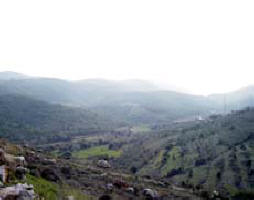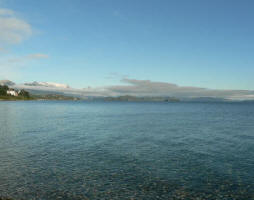 The Programme for the Assessment and Control of Pollution in the Mediterranean Region (MED POL)
The Programme for the Assessment and Control of Pollution in the Mediterranean Region (MED POL)
| Released | 21/02/2006 |
|---|
The Mediterranean sea is constantly submitted to human activities which are seriously endangering its ecosystems. Today only a small percentage of its coastal zone remains almost untouched by this situation.
Widespread eutrophication, heavy metals, organic and microbial pollution, oil spills and introduction of non-indigenous species are the most evident results of the intensity of demographic pressure, the nature and intensity of development activities, the state and type of industry and the agricultural practices of its coastal zone.
Some efforts made and some positive developments achieved at the national and the regional levels, among others, the increased sewage treatment capacity which now covers 50 per cent of the coastal towns and the signature of new binding legal instruments, However, the overall status of the Mediterranean environment still shows the need for specific and immediate action.
The origins of MED POL
The MED POL Programme (Mediterranean Marine Pollution Monitoring and Research Programme) was created in 1975 to answer the specific needs to better assess, qualify and quantify the marine environmental problems of the Mediterranean sea, already put in evidence by previous studies carried out by CIESM and FAO. The Progamme was the scientific and technical component of the Mediterranean Action Plan (MAP).
MED POL - Phase I (1975-1980)
The first phase was formulated and co-ordinated by UNEP with the technical and scientific co-operation of five UN specialised Agencies (FAO, WHO, WMO, IOC of UNESCO and IAEA).
Initially, about 200 research groups all around the Mediterranean carried out seven pilot projects. Later, a regional inter-calibration exercise was also launched to ensure the quality of the data gathered.
Assistance was provided to all riparian countries to enable all laboratories in the region to fully participate in the Programme activities. This assistance, which cost UNEP 9 million USD, included the purchase and regular maintenance of analytical instruments and a full programme of training.
MED POL Phase II (1981-1995)
The second phase was approved by the Mediterranean countries in 1981 and lasted until 1995. During this second Phase the efforts concentrated on the establishment of national monitoring programmes in the Mediterranean countries, which included at the same time the provision of assistance for their implementation. A full data quality assurance programme was put in place covering not only intercalibration exercises but also other activities aiming at improving the quality of the data such as training of personnel, maintenance of instruments, good laboratory practice and the preparation of analytical reference methods. A research programme was also undertaken in support of the monitoring which resulted in more than 500 research projects carried out in 16 Mediterranean countries.
During this Phase the countries collected a large number of marine pollution data. By the end of the Phase II, the MED POL data bank included a large inventory related to chemical contaminants in biota (over 15,000 samples for 50,000 analyses of heavy metals and halogenated hydrocarbons) and microorganisms in sea water (42,000 samples for 53,000 bacterial counts).
Those data, along with others, directly contributed to a more in-depth assessment of the state of the Mediterranean and to the formulation of fifteen pollution control measures, which were later adopted by the Contracting Parties to the Barcelona Convention.
MED POL Phase III - the MED POL programme today (1996-2005)
Towards the end of the phase II of the Programme, important events at the global and regional levels occurred. At the global level, the adoption of Agenda 21 in Rio and of the Global Plan of Action (GPA) to address pollution land-based sources and activities in Washington.
At the regional level, the signature of an amended and more comprehensive Protocol against pollution from land-based sources (LBS Protocol) followed by the creation of the Mediterranean Commission for Sustainable Development (MCSD), indicated the new directions and new priorities to be followed by MED POL.
The MED POL Programme had to operate a gradual switch from pollution assessment to pollution control and become a concrete tool for the Governments to apply the new texts and agreements and to ultimately control and eliminate marine pollution for an appropriate coastal zone management.
From assessment to control of pollution
MED POL Phase III, adopted in 1995 and called "Programme for the assessment and control of pollution in the Mediterranean region", presents a stronger emphasis on the managerial aspects of pollution control and a more direct link with the implementation of the relevant Protocols (Dumping and LBS).
Under the assessment component, it includes activities related to the establishment of trends in the levels of pollutants (trend monitoring) and effects of contaminants (biological effects monitoring) as well as the inventory of pollution sources and loads. A MED POL database is being set up as a result of the monitoring activities.
Under the control component, the Programme includes the monitoring on a continuous basis of the effectiveness of action plans, programmes and measures for pollution control implemented by the Governments (compliance monitoring).
A report on the compliance with the existing national and international legislation is expected from the Governments each year. All the monitoring activities are described in National Programmes agreed upon with the MED POL Secretariat and renewed every year.
Capacity building
A research component is still foreseen to help solve methodological issues or better understand emerging pollution issues.
Meanwhile, the Programme includes an important assistance component related to data quality assurance, design of the monitoring programme, provision of equipment, training for the analysis and interpretation of the data and training for managerial aspects, such as operation of sewage treatment plants and systems of inspection.
MED POL and the regional pollution control instruments
In 1980 the Mediterranean States had signed the Protocol related to the control of pollution from land-based sources (LBS Protocol), committing themselves to take concrete measures to prevent and abate marine pollution. This Protocol was amended in Syracuse in 1996. It now covers all the polluting human activities and obliges the countries to formulate and implement regional and national action plans to reduce and eliminate pollution at source.
A common strategy to eliminate land-based pollution
As a follow-up to the provisions of the amended Protocol, in 1997 the MED POL Secretariat assisted the countries in the formulation and the formal adoption of a regional Strategic Action Programme to Address Pollution of the Mediterranean sea from Land-based Activities (SAP).
The SAP identifies, describes and analyses the main pollution land-based sources and activities, proposes remedial actions, costs them and formulates target dates for their implementation.
It also contains a list of 103 pollution "hot spots" and 51 sensitive areas officially recognised by the Governments as needing special attention and intervention. The list is expected to be regularly updated in order to follow the progress made in the countries in resolving the problems, hot spot by hot spot, and assist them accordingly.
The SAP has now entered in its operational phase, the first important step of which being the establishment of national baseline budgets of land-based pollution emissions which will be the starting point for the pollution reductions to be achieved and monitored.
The MED POL Programme is also in charge of the follow up of the Protocol regulating all dumping operations at sea (Dumping Protocol) and the Protocol related to the protection from pollution by transboundary movements of toxic wastes (Hazardous Wastes Protocol)
International cooperation
MED POL has been the first regional marine pollution programme encompassing all the countries bordering the Mediterranean and it has therefore gained a large experience. In the over all effort to assist the countries to solve pollution problems and in spite of the limited amount of funds at the disposal of MED POL, the Programme has shown that its value was far beyond the funds available.
A valuable basis for joint work
MED POL has in fact created a network of institutions and laboratories working together for a common goal in spite of the evident political, geographical and economical differences of the countries they belonged to.
It has trained hundreds of young scientists in monitoring and analysis of marine pollution and has equipped the laboratories, has formulated common reference methods for pollution analyses, has successfully organised a regional data quality assurance system, has prepared several scientific reports on the state of the marine environment and has substantially assisted the Mediterranean community to formulate, adopt and continuously update legal texts related to the protection of the sea and its coastal zone.
Such very important achievements, together with a deep knowledge of the regional problems and issues, acquired through more than twenty years of work, make the MED POL Programme an essential partner for regional pollution control activities. As a result, MED POL has until now successfully cooperated with the European Union and the European Environment Agency, the World Bank and METAP and other organisations in several projects and activities.
In 1998, a project was also proposed to the Global Environment Facility (GEF) Secretariat concerning assistance to the implementation of the LBS Protocol and the Strategic Action Programme as well as to the long-term solution of the regionally most important "hot spots". A 12 million US dollars Project was finally approved in the year 2000 with a contribution of 6 million from GEF and became operational in 2001.
The Project contains a large marine pollution assessment and control component, including inter alia the preparation of pre-investment studies for pollution "hot spots", to be coordinated by MED POL, and the identification of innovative financial instruments to ensure on the long-term the achievement of the expected reductions of pollution.
The synergy between the proven cohesive potential of MED POL, its experience and its achievements, and international Organizations and donors, will surely boost all the regional and national activities aiming at the elimination of marine pollution.
Coordination
Created in 1975, the MED POL Programme was coordinated by the Regional Seas Programme of UNEP until 1980 when a Coordinating Unit for the Mediterranean Action Plan (MEDU) took over the responsibility of managing all the MAP activities including those of MED POL.
The MED POL Programme has since then been managed by a small team of Mediterranean scientists who assist the work of national laboratories and institutions and national administrations designated to participate and follow up the activities at the national level.
For further information and documents please contact medpol@unepmap.gr
 you are not logged in
you are not logged in





